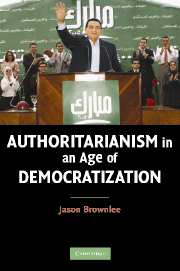Book contents
- Frontmatter
- Contents
- List of Figures and Tables
- Abbreviations and Acronyms
- Acknowledgments
- Introduction: Authoritarianism in an Age of Democratization
- 1 The Political Origins of Durable Authoritarianism
- 2 The Inception of Ruling Parties
- 3 Institutional Legacies and Coalitional Tensions
- 4 Ruling Parties and Regime Persistence
- 5 Elite Defections and Electoral Defeat
- 6 Confrontation and Democratization
- 7 Conclusions
- References
- Index
7 - Conclusions
Published online by Cambridge University Press: 05 June 2012
- Frontmatter
- Contents
- List of Figures and Tables
- Abbreviations and Acronyms
- Acknowledgments
- Introduction: Authoritarianism in an Age of Democratization
- 1 The Political Origins of Durable Authoritarianism
- 2 The Inception of Ruling Parties
- 3 Institutional Legacies and Coalitional Tensions
- 4 Ruling Parties and Regime Persistence
- 5 Elite Defections and Electoral Defeat
- 6 Confrontation and Democratization
- 7 Conclusions
- References
- Index
Summary
Over the preceding chapters, I have developed a historical-institutional explanation for the variation between durable authoritarianism and opportunities for democratization. In this account, the institutional legacies of early elite conflict are the parameters that circumscribe subsequent political actors' contests for power. Weak organizational bonds and the corresponding defection of disgruntled elites are the wellspring of viable opposition alliances, although not the only determinant of their success. This theory of ruling parties and regime persistence builds on an array of existing arguments about regime change and authoritarianism, even as it offers a novel alternative to these accounts. Through a cross-regional comparison that covers an average of half a century's history in each of four countries, I have sought to broaden the generality of my findings.
Findings
This study yields seven main conclusions that expand our understanding of authoritarianism and which I will discuss in turn:
(1) The maintenance and collapse of authoritarian regimes depends on more than just the unrestrained and arbitrary use of power by capricious individuals. Indeed, the reverse is more accurately the case: Organizational restraints prolong and expand power.
(2) The structural opportunities that enable opposition movements to redistribute power and democratize a regime are not caused by mass protest alone, but rather by the intersection of elite defections and opposition activism. In some instances, public elite rifts may energize a beleaguered opposition, but vigorous challenges by the “outs” do not directly disrupt the cohesion of the “ins.”
(3) Some institutions matter more than others. By managing elite conflict, ruling parties shape the interface of other institutions, such as elections, with society. Elections alone do not capsize regimes; rather, discord among regime elites capsizes elections.
[…]
- Type
- Chapter
- Information
- Authoritarianism in an Age of Democratization , pp. 202 - 222Publisher: Cambridge University PressPrint publication year: 2007



